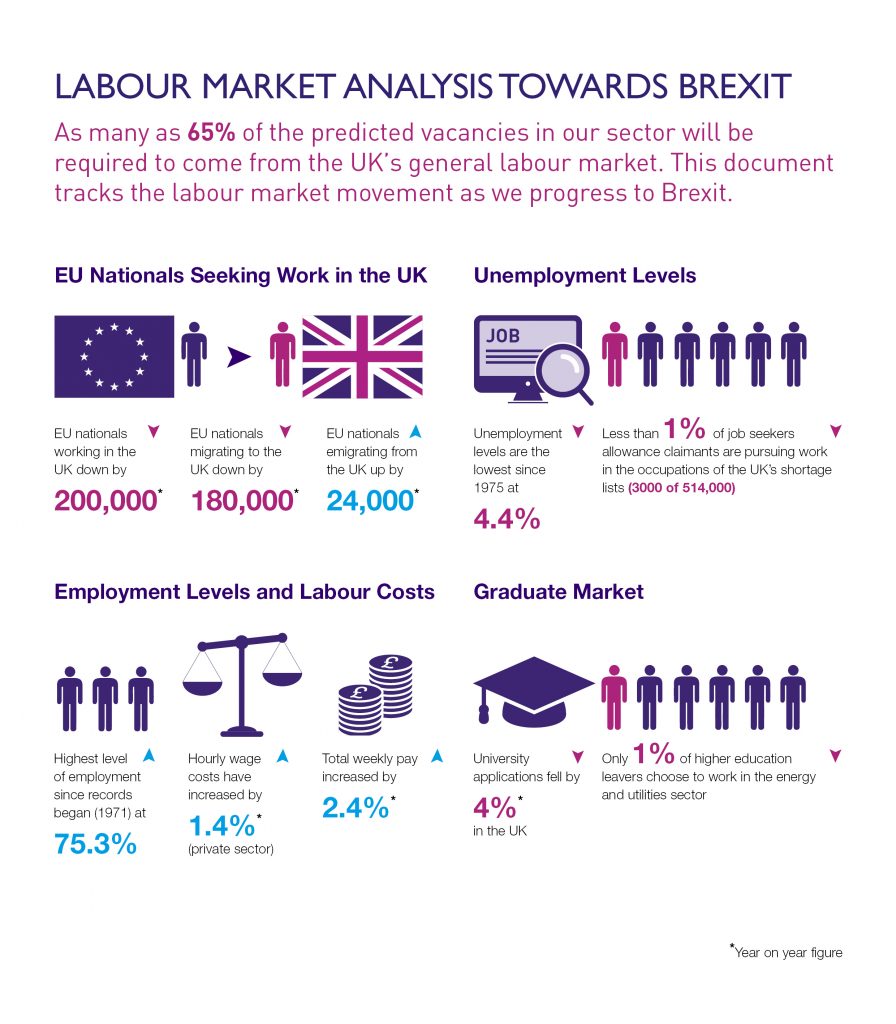Implications of Brexit
On 29 March 2017, the Prime Minister officially triggered Article 50 and began the two-year countdown to the UK formally leaving the EU.
The energy and utilities sector now faces new political uncertainty, in addition to existing workforce challenges. The labour market implications are critical for our sector and we need to do all we can to ensure that our workforce is agile and resilient.
The State of the Labour Market
Energy & Utility Skills’ analysis of recent data published by the Office for National Statistics indicates that the UK’s labour market is arguably tighter than at any point since records began:
- The proportion of people aged 16 to 64 in work (the national employment rate) reached their highest levels in March 2017 at 74.8%. At the same time, the unemployment rate has fallen to its lowest level since July 1975 at 4.6%
- The lack of labour availability is also reflected in job growth across the economy. In the 12 months to December 2016, the number of jobs in the UK economy has grown by just 1.6%
- During the same period, however, the number of jobs in the water supply, sewerage and waste management sector has grown by 8.3% and the power and gas sector grew by 7.9%
This means that our sector is facing intense competition for many of our core skills, rising labour costs and ongoing difficulties in attracting sufficient new recruits.
Brexit Dashboard
Please view our ‘Brexit Dashboard’ for a summary of the latest intelligence on the state of our labour market as we approach Brexit.
As many as 65% of the predicted vacancies in our sector will be required to come from the UK’s general labour market. We track the labour market movement as we progress to Brexit.
EU Nationals seeking work in the UK
- EU nationals working in the UK down by 200,000* ii
- EU nationals migrating to the UK down by 180,000* iii
- EU nationals emigrating from the UK up by 24,000* iv
Unemployment levels
- Unemployment levels are the lowest since 1975 at 4.4% v
- Less than 1% of job seekers allowance claimants are pursuing work in the occupations on the UK’s shortage list (3000 of 514,000) vi
Employment levels and labour costs
- Highest level of employment since records began at 75.3% vii
- Hourly wage costs have increased in the last year by 1.4% (private sector)* viii
- Total weekly pay increased by 2.4%* ix
Graduate Market
- University applications fell by 4% in the UK* x
- Only 1% of higher education leavers choose to work in the energy and utilities sector xi
* Year on year figure

Sources
- i EUSG (2016) Workforce Planning Research Results
- ii ONS (2017) Migration Statistics Quarterly Report
- iii ONS (2017) Migration Statistics Quarterly Report: May 2017
- iv ONS (2017) Migration Statistics Quarterly Report
- v ONS (2017) Labour Force Survey
- vi ONS (2017) Labour Force Survey
- vii ONS (2017) Labour Force Survey
- viii ONS (2017) Labour Force Survey
- ix ONS (2017) Labour Force Survey
- x http://www.bbc.co.uk/news/education-40581643
- xi Energy & Utility Skills (2016) HESA Data Analysis – Higher Education Statistical Summary (2013/2015)
Preparing for the Future
We need to ensure that our labour market is flexible and resilient and, above all, meets the needs of employers. In order to achieve this, Energy & Utility Skills will continue to implement the measures set out in the sector’s Workforce Renewal & Skills Strategy.
We recognise the significance of Brexit for skills, workforce renewal and wider employment issues in our sector and will track developments closely. To help with this, we have created a Brexit Timeline detailing events and milestones as the UK and EU negotiate Britain’s exit.
Please view our Brexit Timeline where we are tracking the latest developments.
Find Out More
If you’re interested in finding out more about membership and our Brexit analysis work, please contact us on 0845 077 99 22 or email membership@euskills.co.uk.
For all press enquires visit our Media Centre.
